Inspire Education: Assessment Workbook 9, Diploma in ECE & Care
VerifiedAdded on 2020/02/05
|76
|15338
|450
Homework Assignment
AI Summary
This document is an assessment workbook for the Diploma in Early Childhood Education & Care, specifically focusing on Program Design and Implementation. Produced by Inspire Education Pty Ltd, the workbook covers various units of competency, including CHCECE017 (Foster the holistic development and wellbeing of the child), CHCECE018 (Nurture creativity in children), CHCECE022 (Promote Children’s Agency), CHCECE023 (Analyse information to inform learning), and CHCECE024 (Design and implement the curriculum). The workbook details assessment methods, instructions for assessors and students, written questions, and assessment coversheets. It emphasizes competency-based assessment, the principles of assessment (validity, reliability, flexibility, fairness), and the rules of evidence. Furthermore, it outlines the four dimensions of competency (task, task management, contingency management, and job role skills) and provides a breakdown of unit components, including performance criteria, performance evidence, knowledge evidence, and assessment conditions. This workbook is designed to guide educators in assessing the skills and knowledge required for effective early childhood education practices.
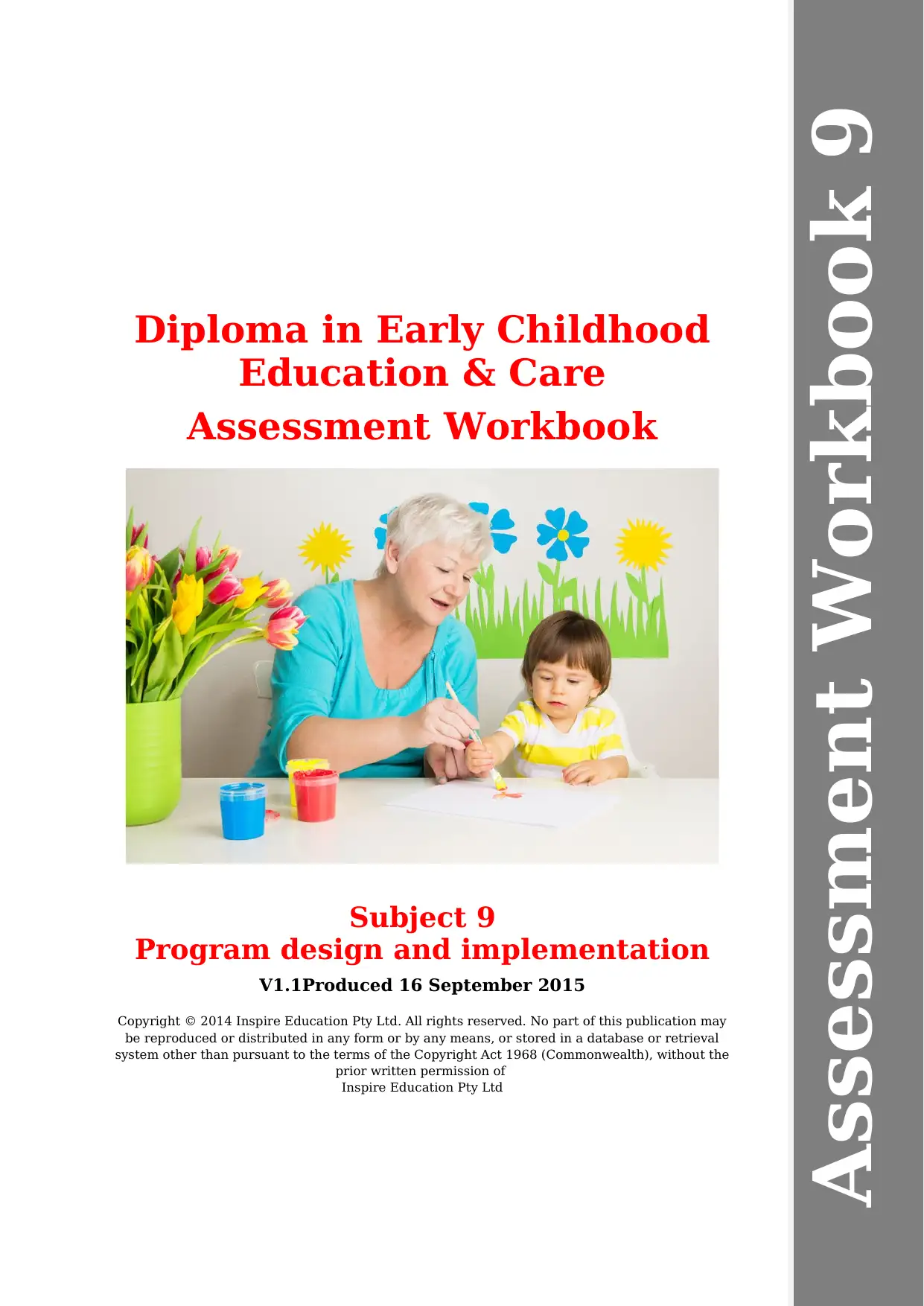
Diploma in Early Childhood
Education & Care
Assessment Workbook
Subject 9
Program design and implementation
V1.1Produced 16 September 2015
Copyright © 2014 Inspire Education Pty Ltd. All rights reserved. No part of this publication may
be reproduced or distributed in any form or by any means, or stored in a database or retrieval
system other than pursuant to the terms of the Copyright Act 1968 (Commonwealth), without the
prior written permission of
Inspire Education Pty Ltd
Assessment Workbook 9
Education & Care
Assessment Workbook
Subject 9
Program design and implementation
V1.1Produced 16 September 2015
Copyright © 2014 Inspire Education Pty Ltd. All rights reserved. No part of this publication may
be reproduced or distributed in any form or by any means, or stored in a database or retrieval
system other than pursuant to the terms of the Copyright Act 1968 (Commonwealth), without the
prior written permission of
Inspire Education Pty Ltd
Assessment Workbook 9
Paraphrase This Document
Need a fresh take? Get an instant paraphrase of this document with our AI Paraphraser
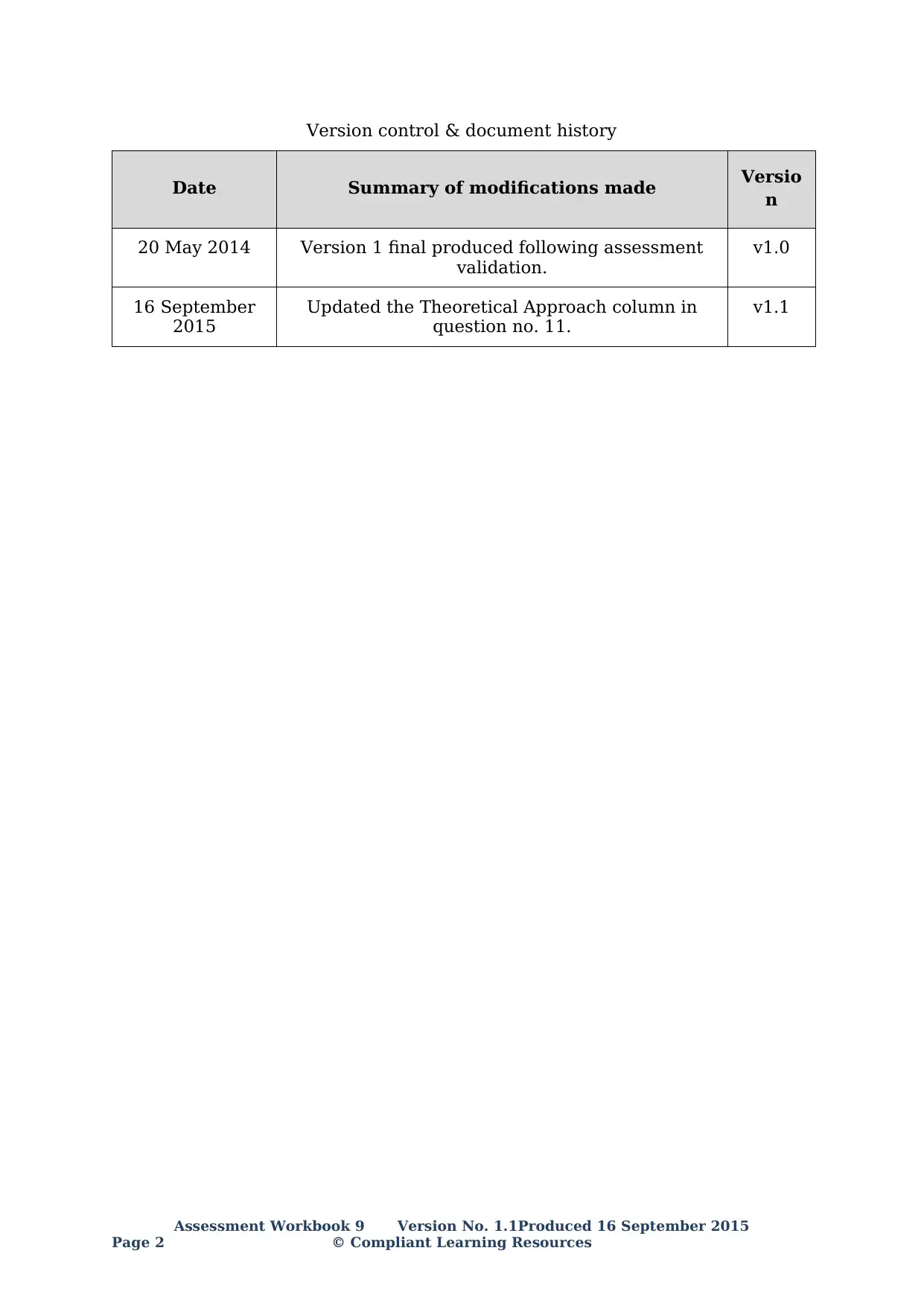
Version control & document history
Date Summary of modifications made Versio
n
20 May 2014 Version 1 final produced following assessment
validation.
v1.0
16 September
2015
Updated the Theoretical Approach column in
question no. 11.
v1.1
Assessment Workbook 9 Version No. 1.1Produced 16 September 2015
Page 2 © Compliant Learning Resources
Date Summary of modifications made Versio
n
20 May 2014 Version 1 final produced following assessment
validation.
v1.0
16 September
2015
Updated the Theoretical Approach column in
question no. 11.
v1.1
Assessment Workbook 9 Version No. 1.1Produced 16 September 2015
Page 2 © Compliant Learning Resources
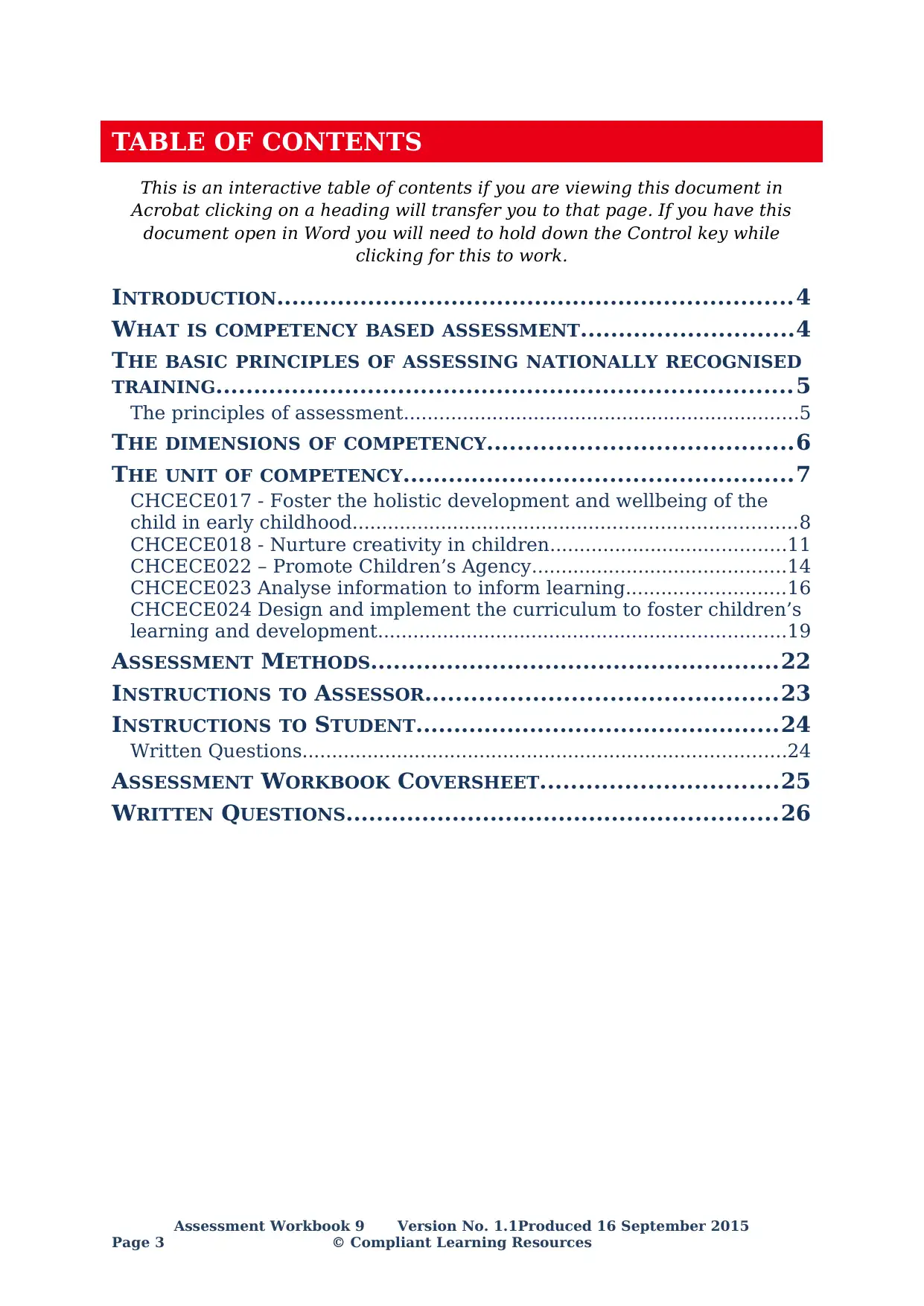
TABLE OF CONTENTS
This is an interactive table of contents if you are viewing this document in
Acrobat clicking on a heading will transfer you to that page. If you have this
document open in Word you will need to hold down the Control key while
clicking for this to work.
INTRODUCTION....................................................................4
WHAT IS COMPETENCY BASED ASSESSMENT............................4
THE BASIC PRINCIPLES OF ASSESSING NATIONALLY RECOGNISED
TRAINING............................................................................5
The principles of assessment...................................................................5
THE DIMENSIONS OF COMPETENCY........................................6
THE UNIT OF COMPETENCY...................................................7
CHCECE017 - Foster the holistic development and wellbeing of the
child in early childhood...........................................................................8
CHCECE018 - Nurture creativity in children........................................11
CHCECE022 – Promote Children’s Agency...........................................14
CHCECE023 Analyse information to inform learning...........................16
CHCECE024 Design and implement the curriculum to foster children’s
learning and development.....................................................................19
ASSESSMENT METHODS......................................................22
INSTRUCTIONS TO ASSESSOR..............................................23
INSTRUCTIONS TO STUDENT................................................24
Written Questions..................................................................................24
ASSESSMENT WORKBOOK COVERSHEET...............................25
WRITTEN QUESTIONS.........................................................26
Assessment Workbook 9 Version No. 1.1Produced 16 September 2015
Page 3 © Compliant Learning Resources
This is an interactive table of contents if you are viewing this document in
Acrobat clicking on a heading will transfer you to that page. If you have this
document open in Word you will need to hold down the Control key while
clicking for this to work.
INTRODUCTION....................................................................4
WHAT IS COMPETENCY BASED ASSESSMENT............................4
THE BASIC PRINCIPLES OF ASSESSING NATIONALLY RECOGNISED
TRAINING............................................................................5
The principles of assessment...................................................................5
THE DIMENSIONS OF COMPETENCY........................................6
THE UNIT OF COMPETENCY...................................................7
CHCECE017 - Foster the holistic development and wellbeing of the
child in early childhood...........................................................................8
CHCECE018 - Nurture creativity in children........................................11
CHCECE022 – Promote Children’s Agency...........................................14
CHCECE023 Analyse information to inform learning...........................16
CHCECE024 Design and implement the curriculum to foster children’s
learning and development.....................................................................19
ASSESSMENT METHODS......................................................22
INSTRUCTIONS TO ASSESSOR..............................................23
INSTRUCTIONS TO STUDENT................................................24
Written Questions..................................................................................24
ASSESSMENT WORKBOOK COVERSHEET...............................25
WRITTEN QUESTIONS.........................................................26
Assessment Workbook 9 Version No. 1.1Produced 16 September 2015
Page 3 © Compliant Learning Resources
⊘ This is a preview!⊘
Do you want full access?
Subscribe today to unlock all pages.

Trusted by 1+ million students worldwide
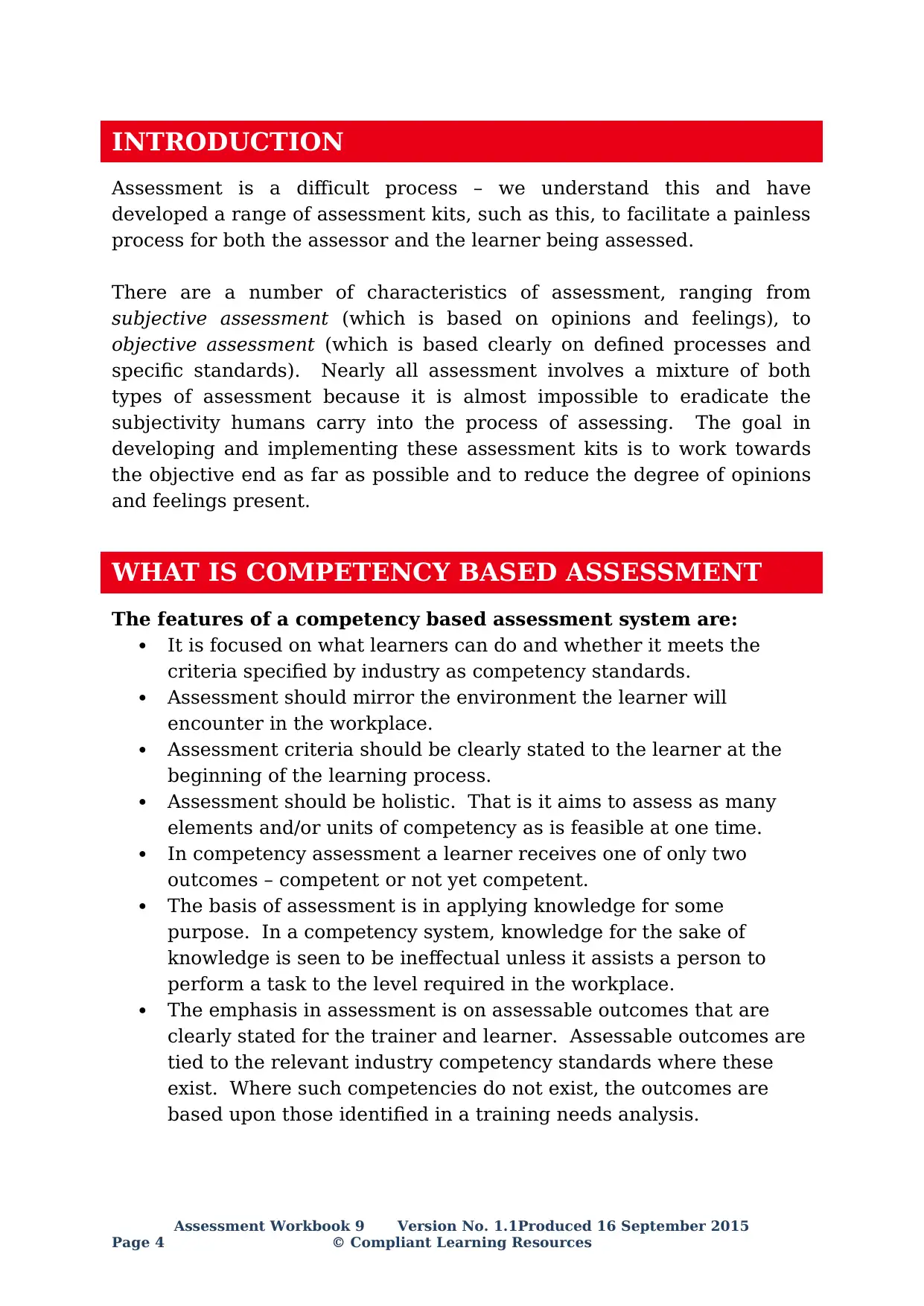
INTRODUCTION
Assessment is a difficult process – we understand this and have
developed a range of assessment kits, such as this, to facilitate a painless
process for both the assessor and the learner being assessed.
There are a number of characteristics of assessment, ranging from
subjective assessment (which is based on opinions and feelings), to
objective assessment (which is based clearly on defined processes and
specific standards). Nearly all assessment involves a mixture of both
types of assessment because it is almost impossible to eradicate the
subjectivity humans carry into the process of assessing. The goal in
developing and implementing these assessment kits is to work towards
the objective end as far as possible and to reduce the degree of opinions
and feelings present.
WHAT IS COMPETENCY BASED ASSESSMENT
The features of a competency based assessment system are:
It is focused on what learners can do and whether it meets the
criteria specified by industry as competency standards.
Assessment should mirror the environment the learner will
encounter in the workplace.
Assessment criteria should be clearly stated to the learner at the
beginning of the learning process.
Assessment should be holistic. That is it aims to assess as many
elements and/or units of competency as is feasible at one time.
In competency assessment a learner receives one of only two
outcomes – competent or not yet competent.
The basis of assessment is in applying knowledge for some
purpose. In a competency system, knowledge for the sake of
knowledge is seen to be ineffectual unless it assists a person to
perform a task to the level required in the workplace.
The emphasis in assessment is on assessable outcomes that are
clearly stated for the trainer and learner. Assessable outcomes are
tied to the relevant industry competency standards where these
exist. Where such competencies do not exist, the outcomes are
based upon those identified in a training needs analysis.
Assessment Workbook 9 Version No. 1.1Produced 16 September 2015
Page 4 © Compliant Learning Resources
Assessment is a difficult process – we understand this and have
developed a range of assessment kits, such as this, to facilitate a painless
process for both the assessor and the learner being assessed.
There are a number of characteristics of assessment, ranging from
subjective assessment (which is based on opinions and feelings), to
objective assessment (which is based clearly on defined processes and
specific standards). Nearly all assessment involves a mixture of both
types of assessment because it is almost impossible to eradicate the
subjectivity humans carry into the process of assessing. The goal in
developing and implementing these assessment kits is to work towards
the objective end as far as possible and to reduce the degree of opinions
and feelings present.
WHAT IS COMPETENCY BASED ASSESSMENT
The features of a competency based assessment system are:
It is focused on what learners can do and whether it meets the
criteria specified by industry as competency standards.
Assessment should mirror the environment the learner will
encounter in the workplace.
Assessment criteria should be clearly stated to the learner at the
beginning of the learning process.
Assessment should be holistic. That is it aims to assess as many
elements and/or units of competency as is feasible at one time.
In competency assessment a learner receives one of only two
outcomes – competent or not yet competent.
The basis of assessment is in applying knowledge for some
purpose. In a competency system, knowledge for the sake of
knowledge is seen to be ineffectual unless it assists a person to
perform a task to the level required in the workplace.
The emphasis in assessment is on assessable outcomes that are
clearly stated for the trainer and learner. Assessable outcomes are
tied to the relevant industry competency standards where these
exist. Where such competencies do not exist, the outcomes are
based upon those identified in a training needs analysis.
Assessment Workbook 9 Version No. 1.1Produced 16 September 2015
Page 4 © Compliant Learning Resources
Paraphrase This Document
Need a fresh take? Get an instant paraphrase of this document with our AI Paraphraser
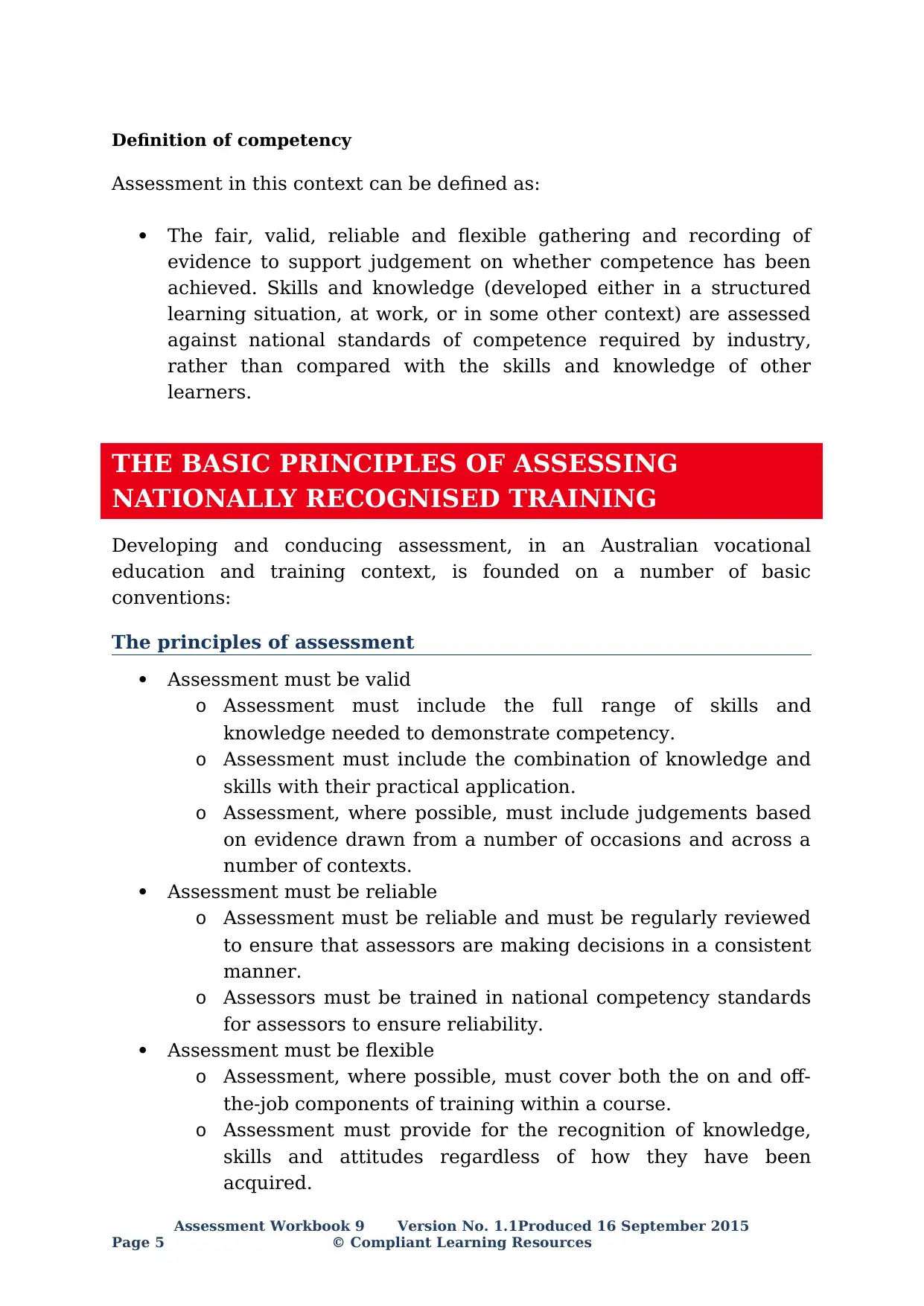
Definition of competency
Assessment in this context can be defined as:
The fair, valid, reliable and flexible gathering and recording of
evidence to support judgement on whether competence has been
achieved. Skills and knowledge (developed either in a structured
learning situation, at work, or in some other context) are assessed
against national standards of competence required by industry,
rather than compared with the skills and knowledge of other
learners.
THE BASIC PRINCIPLES OF ASSESSING
NATIONALLY RECOGNISED TRAINING
Developing and conducing assessment, in an Australian vocational
education and training context, is founded on a number of basic
conventions:
The principles of assessment
Assessment must be valid
o Assessment must include the full range of skills and
knowledge needed to demonstrate competency.
o Assessment must include the combination of knowledge and
skills with their practical application.
o Assessment, where possible, must include judgements based
on evidence drawn from a number of occasions and across a
number of contexts.
Assessment must be reliable
o Assessment must be reliable and must be regularly reviewed
to ensure that assessors are making decisions in a consistent
manner.
o Assessors must be trained in national competency standards
for assessors to ensure reliability.
Assessment must be flexible
o Assessment, where possible, must cover both the on and off-
the-job components of training within a course.
o Assessment must provide for the recognition of knowledge,
skills and attitudes regardless of how they have been
acquired.
Assessment Workbook 9 Version No. 1.1Produced 16 September 2015
Page 5 © Compliant Learning Resources
Assessment in this context can be defined as:
The fair, valid, reliable and flexible gathering and recording of
evidence to support judgement on whether competence has been
achieved. Skills and knowledge (developed either in a structured
learning situation, at work, or in some other context) are assessed
against national standards of competence required by industry,
rather than compared with the skills and knowledge of other
learners.
THE BASIC PRINCIPLES OF ASSESSING
NATIONALLY RECOGNISED TRAINING
Developing and conducing assessment, in an Australian vocational
education and training context, is founded on a number of basic
conventions:
The principles of assessment
Assessment must be valid
o Assessment must include the full range of skills and
knowledge needed to demonstrate competency.
o Assessment must include the combination of knowledge and
skills with their practical application.
o Assessment, where possible, must include judgements based
on evidence drawn from a number of occasions and across a
number of contexts.
Assessment must be reliable
o Assessment must be reliable and must be regularly reviewed
to ensure that assessors are making decisions in a consistent
manner.
o Assessors must be trained in national competency standards
for assessors to ensure reliability.
Assessment must be flexible
o Assessment, where possible, must cover both the on and off-
the-job components of training within a course.
o Assessment must provide for the recognition of knowledge,
skills and attitudes regardless of how they have been
acquired.
Assessment Workbook 9 Version No. 1.1Produced 16 September 2015
Page 5 © Compliant Learning Resources
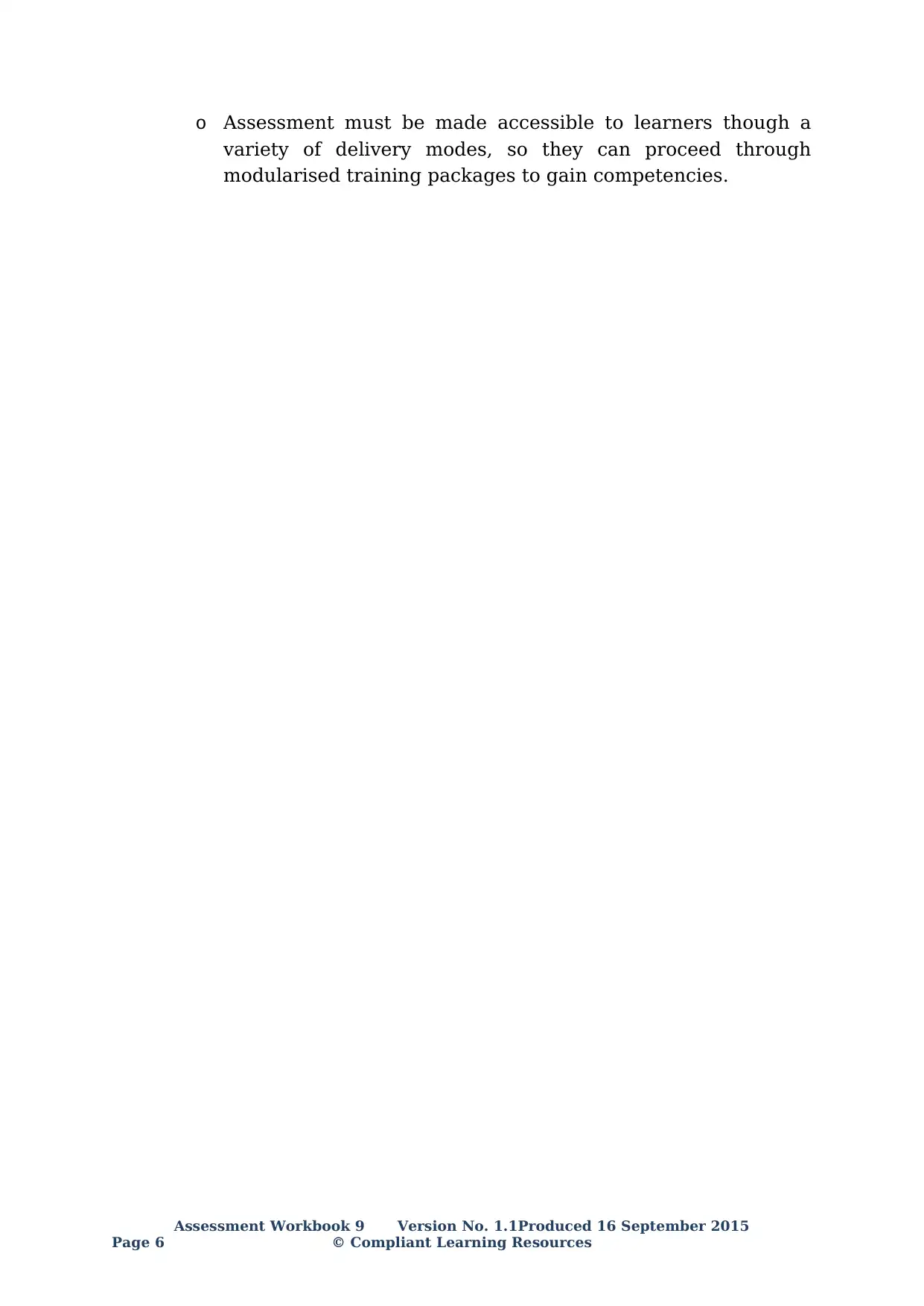
o Assessment must be made accessible to learners though a
variety of delivery modes, so they can proceed through
modularised training packages to gain competencies.
Assessment Workbook 9 Version No. 1.1Produced 16 September 2015
Page 6 © Compliant Learning Resources
variety of delivery modes, so they can proceed through
modularised training packages to gain competencies.
Assessment Workbook 9 Version No. 1.1Produced 16 September 2015
Page 6 © Compliant Learning Resources
⊘ This is a preview!⊘
Do you want full access?
Subscribe today to unlock all pages.

Trusted by 1+ million students worldwide
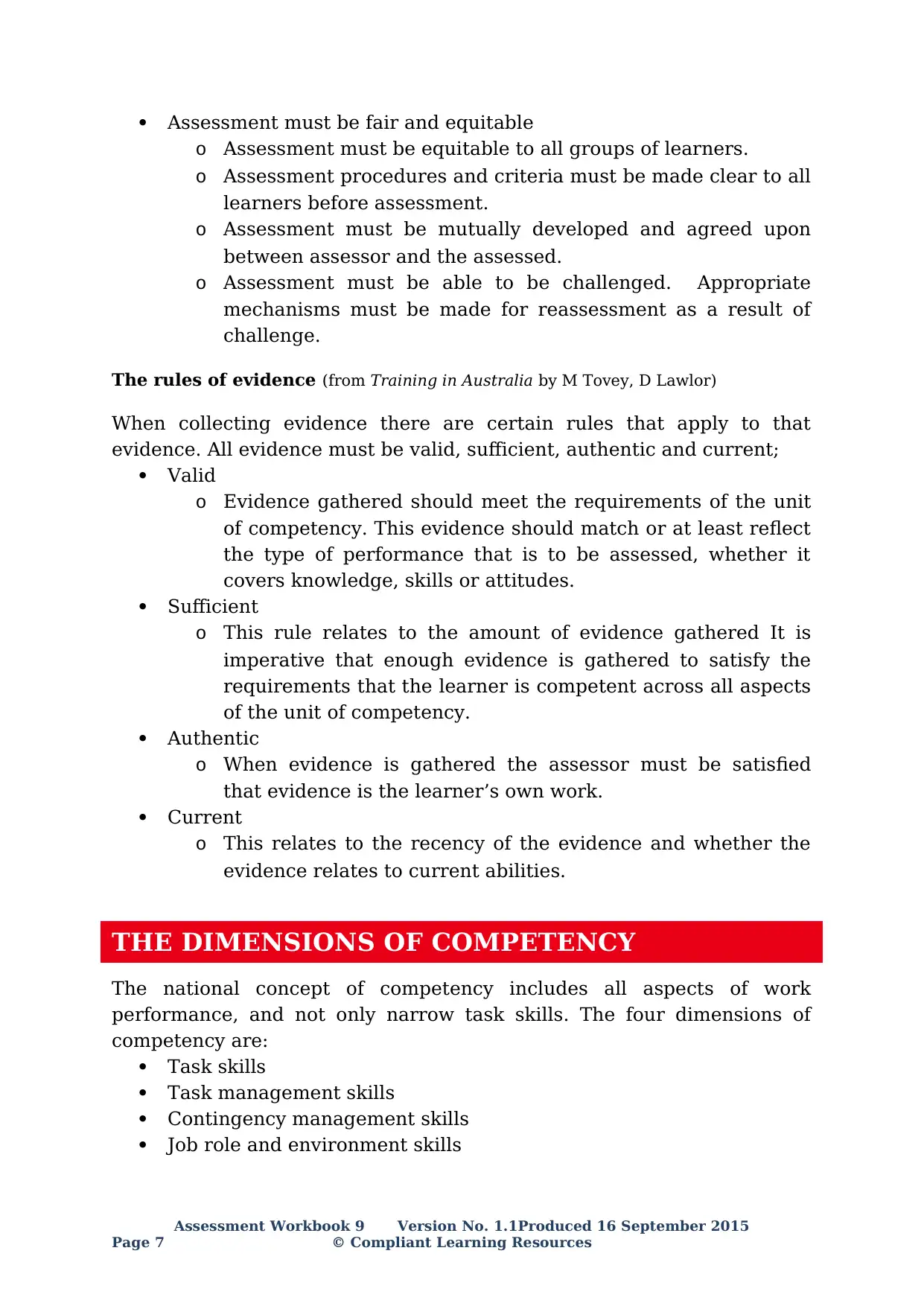
Assessment must be fair and equitable
o Assessment must be equitable to all groups of learners.
o Assessment procedures and criteria must be made clear to all
learners before assessment.
o Assessment must be mutually developed and agreed upon
between assessor and the assessed.
o Assessment must be able to be challenged. Appropriate
mechanisms must be made for reassessment as a result of
challenge.
The rules of evidence (from Training in Australia by M Tovey, D Lawlor)
When collecting evidence there are certain rules that apply to that
evidence. All evidence must be valid, sufficient, authentic and current;
Valid
o Evidence gathered should meet the requirements of the unit
of competency. This evidence should match or at least reflect
the type of performance that is to be assessed, whether it
covers knowledge, skills or attitudes.
Sufficient
o This rule relates to the amount of evidence gathered It is
imperative that enough evidence is gathered to satisfy the
requirements that the learner is competent across all aspects
of the unit of competency.
Authentic
o When evidence is gathered the assessor must be satisfied
that evidence is the learner’s own work.
Current
o This relates to the recency of the evidence and whether the
evidence relates to current abilities.
THE DIMENSIONS OF COMPETENCY
The national concept of competency includes all aspects of work
performance, and not only narrow task skills. The four dimensions of
competency are:
Task skills
Task management skills
Contingency management skills
Job role and environment skills
Assessment Workbook 9 Version No. 1.1Produced 16 September 2015
Page 7 © Compliant Learning Resources
o Assessment must be equitable to all groups of learners.
o Assessment procedures and criteria must be made clear to all
learners before assessment.
o Assessment must be mutually developed and agreed upon
between assessor and the assessed.
o Assessment must be able to be challenged. Appropriate
mechanisms must be made for reassessment as a result of
challenge.
The rules of evidence (from Training in Australia by M Tovey, D Lawlor)
When collecting evidence there are certain rules that apply to that
evidence. All evidence must be valid, sufficient, authentic and current;
Valid
o Evidence gathered should meet the requirements of the unit
of competency. This evidence should match or at least reflect
the type of performance that is to be assessed, whether it
covers knowledge, skills or attitudes.
Sufficient
o This rule relates to the amount of evidence gathered It is
imperative that enough evidence is gathered to satisfy the
requirements that the learner is competent across all aspects
of the unit of competency.
Authentic
o When evidence is gathered the assessor must be satisfied
that evidence is the learner’s own work.
Current
o This relates to the recency of the evidence and whether the
evidence relates to current abilities.
THE DIMENSIONS OF COMPETENCY
The national concept of competency includes all aspects of work
performance, and not only narrow task skills. The four dimensions of
competency are:
Task skills
Task management skills
Contingency management skills
Job role and environment skills
Assessment Workbook 9 Version No. 1.1Produced 16 September 2015
Page 7 © Compliant Learning Resources
Paraphrase This Document
Need a fresh take? Get an instant paraphrase of this document with our AI Paraphraser
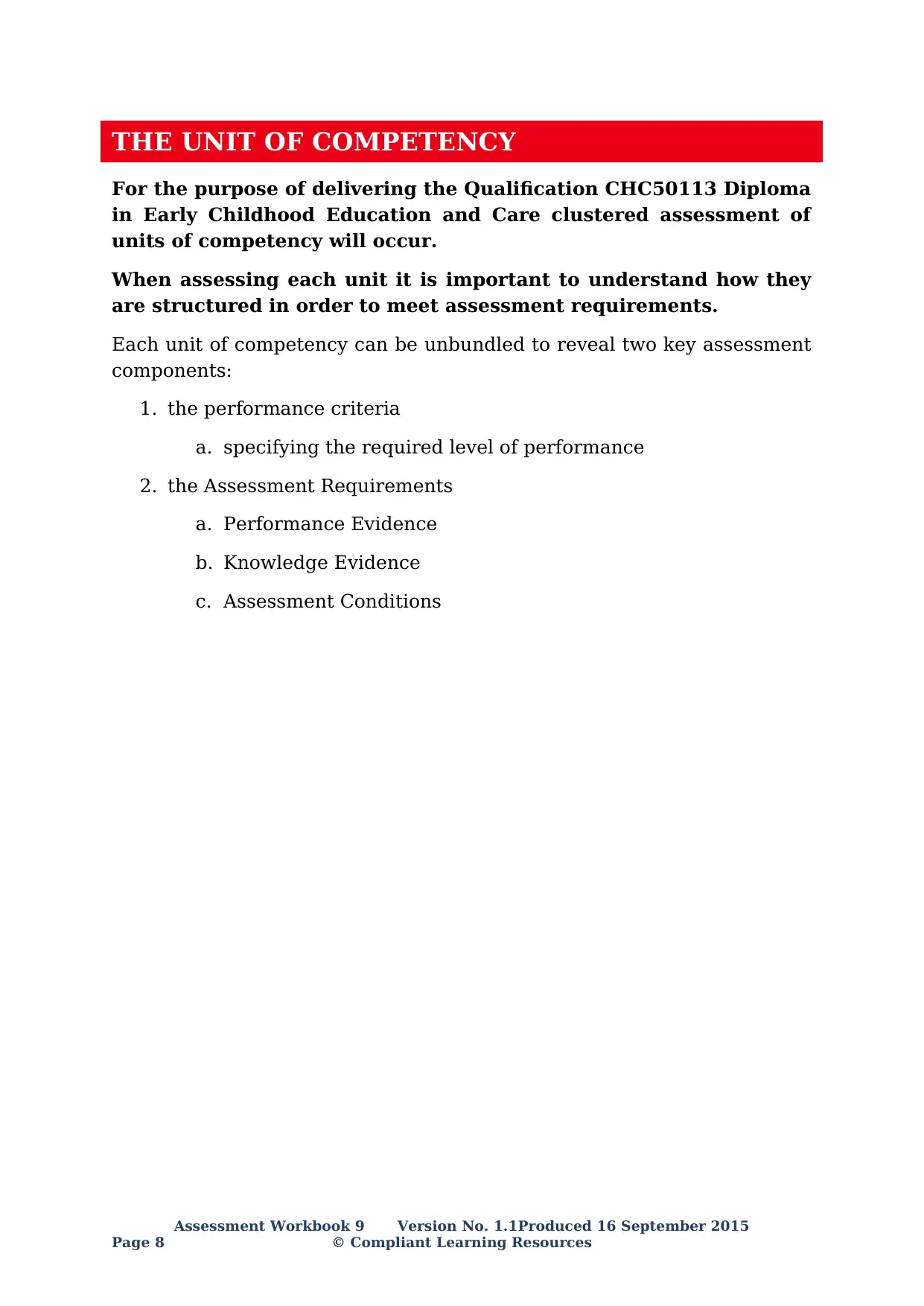
THE UNIT OF COMPETENCY
For the purpose of delivering the Qualification CHC50113 Diploma
in Early Childhood Education and Care clustered assessment of
units of competency will occur.
When assessing each unit it is important to understand how they
are structured in order to meet assessment requirements.
Each unit of competency can be unbundled to reveal two key assessment
components:
1. the performance criteria
a. specifying the required level of performance
2. the Assessment Requirements
a. Performance Evidence
b. Knowledge Evidence
c. Assessment Conditions
Assessment Workbook 9 Version No. 1.1Produced 16 September 2015
Page 8 © Compliant Learning Resources
For the purpose of delivering the Qualification CHC50113 Diploma
in Early Childhood Education and Care clustered assessment of
units of competency will occur.
When assessing each unit it is important to understand how they
are structured in order to meet assessment requirements.
Each unit of competency can be unbundled to reveal two key assessment
components:
1. the performance criteria
a. specifying the required level of performance
2. the Assessment Requirements
a. Performance Evidence
b. Knowledge Evidence
c. Assessment Conditions
Assessment Workbook 9 Version No. 1.1Produced 16 September 2015
Page 8 © Compliant Learning Resources
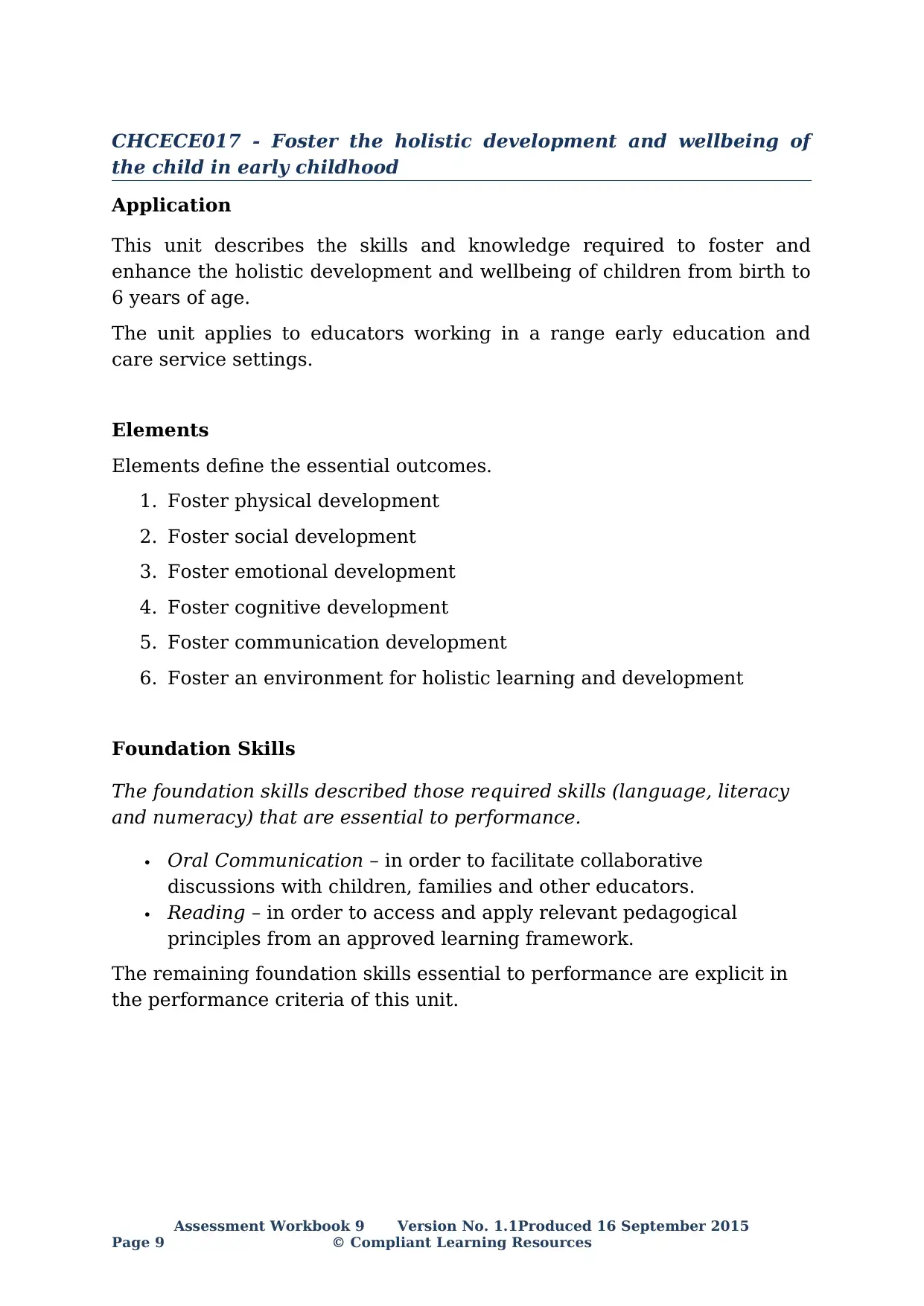
CHCECE017 - Foster the holistic development and wellbeing of
the child in early childhood
Application
This unit describes the skills and knowledge required to foster and
enhance the holistic development and wellbeing of children from birth to
6 years of age.
The unit applies to educators working in a range early education and
care service settings.
Elements
Elements define the essential outcomes.
1. Foster physical development
2. Foster social development
3. Foster emotional development
4. Foster cognitive development
5. Foster communication development
6. Foster an environment for holistic learning and development
Foundation Skills
The foundation skills described those required skills (language, literacy
and numeracy) that are essential to performance.
Oral Communication – in order to facilitate collaborative
discussions with children, families and other educators.
Reading – in order to access and apply relevant pedagogical
principles from an approved learning framework.
The remaining foundation skills essential to performance are explicit in
the performance criteria of this unit.
Assessment Workbook 9 Version No. 1.1Produced 16 September 2015
Page 9 © Compliant Learning Resources
the child in early childhood
Application
This unit describes the skills and knowledge required to foster and
enhance the holistic development and wellbeing of children from birth to
6 years of age.
The unit applies to educators working in a range early education and
care service settings.
Elements
Elements define the essential outcomes.
1. Foster physical development
2. Foster social development
3. Foster emotional development
4. Foster cognitive development
5. Foster communication development
6. Foster an environment for holistic learning and development
Foundation Skills
The foundation skills described those required skills (language, literacy
and numeracy) that are essential to performance.
Oral Communication – in order to facilitate collaborative
discussions with children, families and other educators.
Reading – in order to access and apply relevant pedagogical
principles from an approved learning framework.
The remaining foundation skills essential to performance are explicit in
the performance criteria of this unit.
Assessment Workbook 9 Version No. 1.1Produced 16 September 2015
Page 9 © Compliant Learning Resources
⊘ This is a preview!⊘
Do you want full access?
Subscribe today to unlock all pages.

Trusted by 1+ million students worldwide
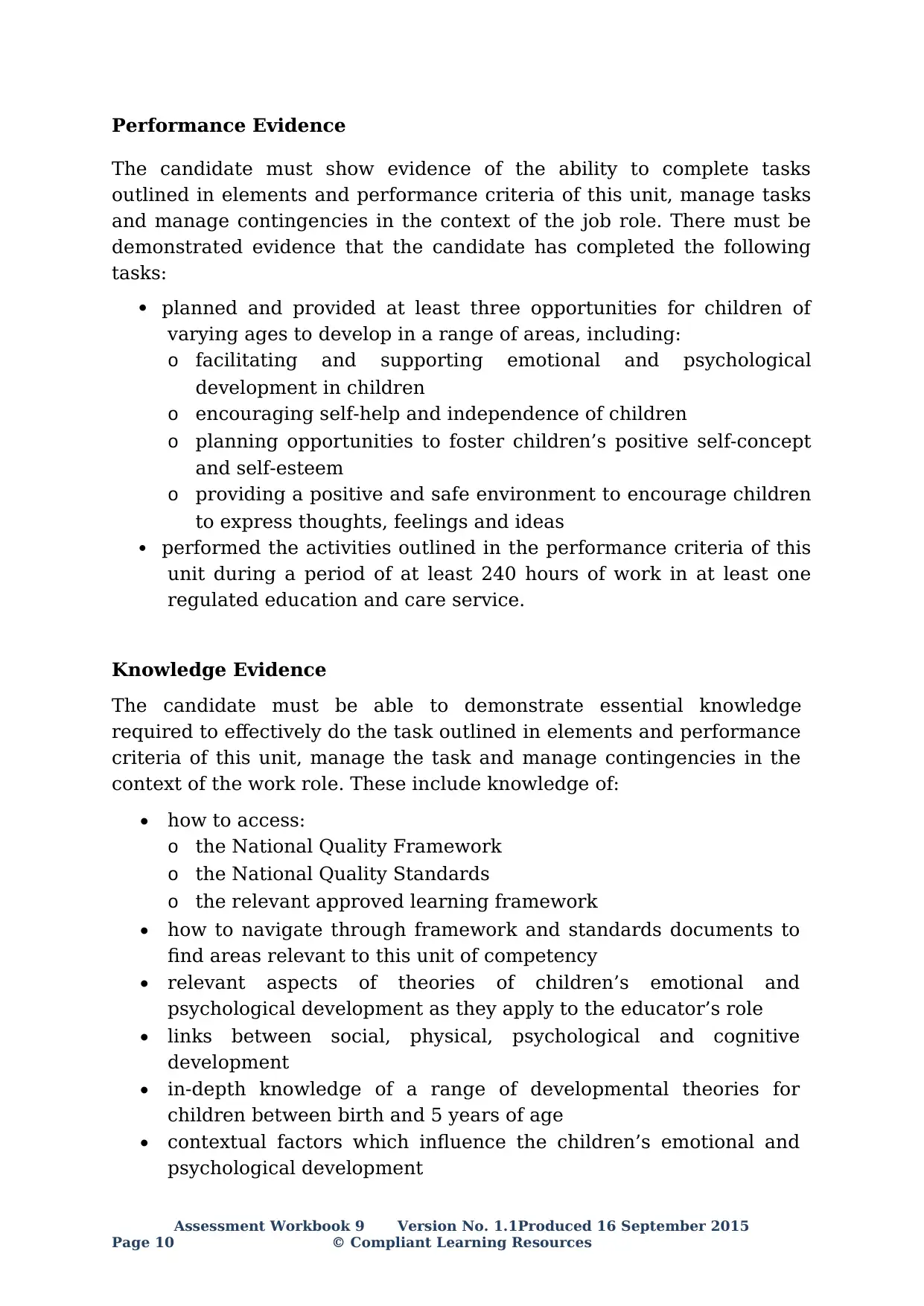
Performance Evidence
The candidate must show evidence of the ability to complete tasks
outlined in elements and performance criteria of this unit, manage tasks
and manage contingencies in the context of the job role. There must be
demonstrated evidence that the candidate has completed the following
tasks:
planned and provided at least three opportunities for children of
varying ages to develop in a range of areas, including:
o facilitating and supporting emotional and psychological
development in children
o encouraging self-help and independence of children
o planning opportunities to foster children’s positive self-concept
and self-esteem
o providing a positive and safe environment to encourage children
to express thoughts, feelings and ideas
performed the activities outlined in the performance criteria of this
unit during a period of at least 240 hours of work in at least one
regulated education and care service.
Knowledge Evidence
The candidate must be able to demonstrate essential knowledge
required to effectively do the task outlined in elements and performance
criteria of this unit, manage the task and manage contingencies in the
context of the work role. These include knowledge of:
• how to access:
o the National Quality Framework
o the National Quality Standards
o the relevant approved learning framework
• how to navigate through framework and standards documents to
find areas relevant to this unit of competency
• relevant aspects of theories of children’s emotional and
psychological development as they apply to the educator’s role
• links between social, physical, psychological and cognitive
development
• in-depth knowledge of a range of developmental theories for
children between birth and 5 years of age
• contextual factors which influence the children’s emotional and
psychological development
Assessment Workbook 9 Version No. 1.1Produced 16 September 2015
Page 10 © Compliant Learning Resources
The candidate must show evidence of the ability to complete tasks
outlined in elements and performance criteria of this unit, manage tasks
and manage contingencies in the context of the job role. There must be
demonstrated evidence that the candidate has completed the following
tasks:
planned and provided at least three opportunities for children of
varying ages to develop in a range of areas, including:
o facilitating and supporting emotional and psychological
development in children
o encouraging self-help and independence of children
o planning opportunities to foster children’s positive self-concept
and self-esteem
o providing a positive and safe environment to encourage children
to express thoughts, feelings and ideas
performed the activities outlined in the performance criteria of this
unit during a period of at least 240 hours of work in at least one
regulated education and care service.
Knowledge Evidence
The candidate must be able to demonstrate essential knowledge
required to effectively do the task outlined in elements and performance
criteria of this unit, manage the task and manage contingencies in the
context of the work role. These include knowledge of:
• how to access:
o the National Quality Framework
o the National Quality Standards
o the relevant approved learning framework
• how to navigate through framework and standards documents to
find areas relevant to this unit of competency
• relevant aspects of theories of children’s emotional and
psychological development as they apply to the educator’s role
• links between social, physical, psychological and cognitive
development
• in-depth knowledge of a range of developmental theories for
children between birth and 5 years of age
• contextual factors which influence the children’s emotional and
psychological development
Assessment Workbook 9 Version No. 1.1Produced 16 September 2015
Page 10 © Compliant Learning Resources
Paraphrase This Document
Need a fresh take? Get an instant paraphrase of this document with our AI Paraphraser
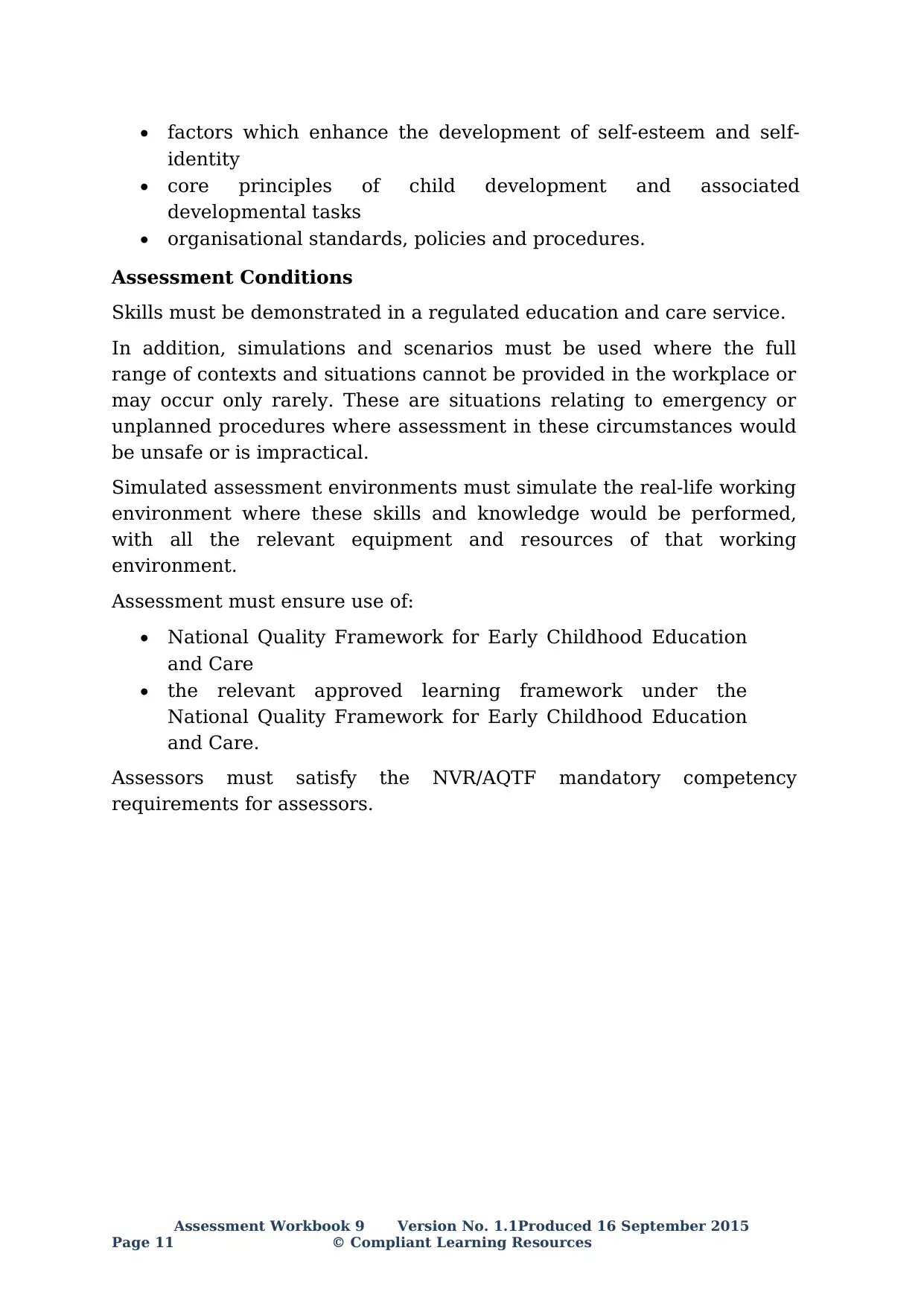
• factors which enhance the development of self-esteem and self-
identity
• core principles of child development and associated
developmental tasks
• organisational standards, policies and procedures.
Assessment Conditions
Skills must be demonstrated in a regulated education and care service.
In addition, simulations and scenarios must be used where the full
range of contexts and situations cannot be provided in the workplace or
may occur only rarely. These are situations relating to emergency or
unplanned procedures where assessment in these circumstances would
be unsafe or is impractical.
Simulated assessment environments must simulate the real-life working
environment where these skills and knowledge would be performed,
with all the relevant equipment and resources of that working
environment.
Assessment must ensure use of:
• National Quality Framework for Early Childhood Education
and Care
• the relevant approved learning framework under the
National Quality Framework for Early Childhood Education
and Care.
Assessors must satisfy the NVR/AQTF mandatory competency
requirements for assessors.
Assessment Workbook 9 Version No. 1.1Produced 16 September 2015
Page 11 © Compliant Learning Resources
identity
• core principles of child development and associated
developmental tasks
• organisational standards, policies and procedures.
Assessment Conditions
Skills must be demonstrated in a regulated education and care service.
In addition, simulations and scenarios must be used where the full
range of contexts and situations cannot be provided in the workplace or
may occur only rarely. These are situations relating to emergency or
unplanned procedures where assessment in these circumstances would
be unsafe or is impractical.
Simulated assessment environments must simulate the real-life working
environment where these skills and knowledge would be performed,
with all the relevant equipment and resources of that working
environment.
Assessment must ensure use of:
• National Quality Framework for Early Childhood Education
and Care
• the relevant approved learning framework under the
National Quality Framework for Early Childhood Education
and Care.
Assessors must satisfy the NVR/AQTF mandatory competency
requirements for assessors.
Assessment Workbook 9 Version No. 1.1Produced 16 September 2015
Page 11 © Compliant Learning Resources
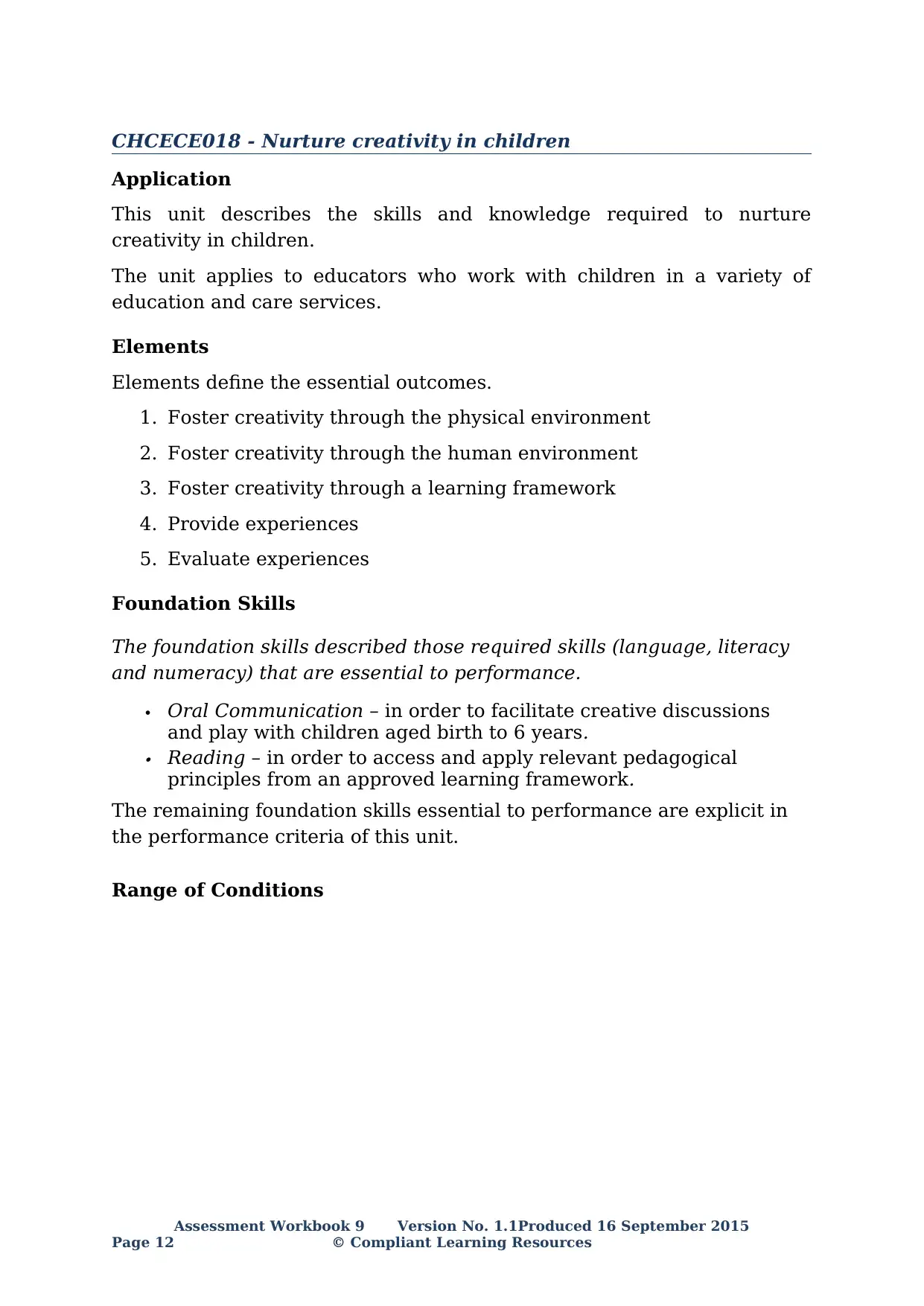
CHCECE018 - Nurture creativity in children
Application
This unit describes the skills and knowledge required to nurture
creativity in children.
The unit applies to educators who work with children in a variety of
education and care services.
Elements
Elements define the essential outcomes.
1. Foster creativity through the physical environment
2. Foster creativity through the human environment
3. Foster creativity through a learning framework
4. Provide experiences
5. Evaluate experiences
Foundation Skills
The foundation skills described those required skills (language, literacy
and numeracy) that are essential to performance.
Oral Communication – in order to facilitate creative discussions
and play with children aged birth to 6 years.
Reading – in order to access and apply relevant pedagogical
principles from an approved learning framework.
The remaining foundation skills essential to performance are explicit in
the performance criteria of this unit.
Range of Conditions
Assessment Workbook 9 Version No. 1.1Produced 16 September 2015
Page 12 © Compliant Learning Resources
Application
This unit describes the skills and knowledge required to nurture
creativity in children.
The unit applies to educators who work with children in a variety of
education and care services.
Elements
Elements define the essential outcomes.
1. Foster creativity through the physical environment
2. Foster creativity through the human environment
3. Foster creativity through a learning framework
4. Provide experiences
5. Evaluate experiences
Foundation Skills
The foundation skills described those required skills (language, literacy
and numeracy) that are essential to performance.
Oral Communication – in order to facilitate creative discussions
and play with children aged birth to 6 years.
Reading – in order to access and apply relevant pedagogical
principles from an approved learning framework.
The remaining foundation skills essential to performance are explicit in
the performance criteria of this unit.
Range of Conditions
Assessment Workbook 9 Version No. 1.1Produced 16 September 2015
Page 12 © Compliant Learning Resources
⊘ This is a preview!⊘
Do you want full access?
Subscribe today to unlock all pages.

Trusted by 1+ million students worldwide
1 out of 76
Related Documents
Your All-in-One AI-Powered Toolkit for Academic Success.
+13062052269
info@desklib.com
Available 24*7 on WhatsApp / Email
![[object Object]](/_next/static/media/star-bottom.7253800d.svg)
Unlock your academic potential
Copyright © 2020–2026 A2Z Services. All Rights Reserved. Developed and managed by ZUCOL.





